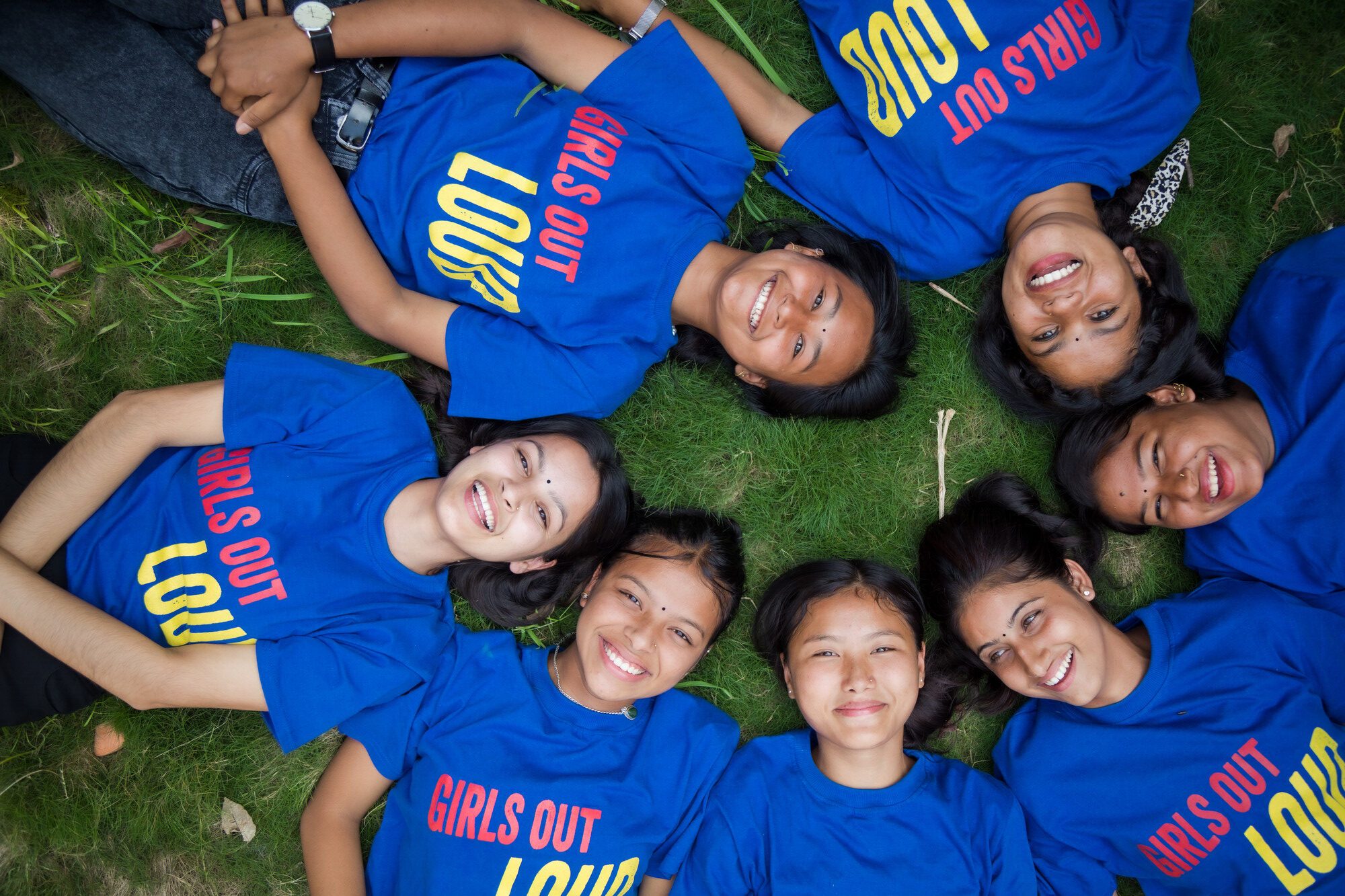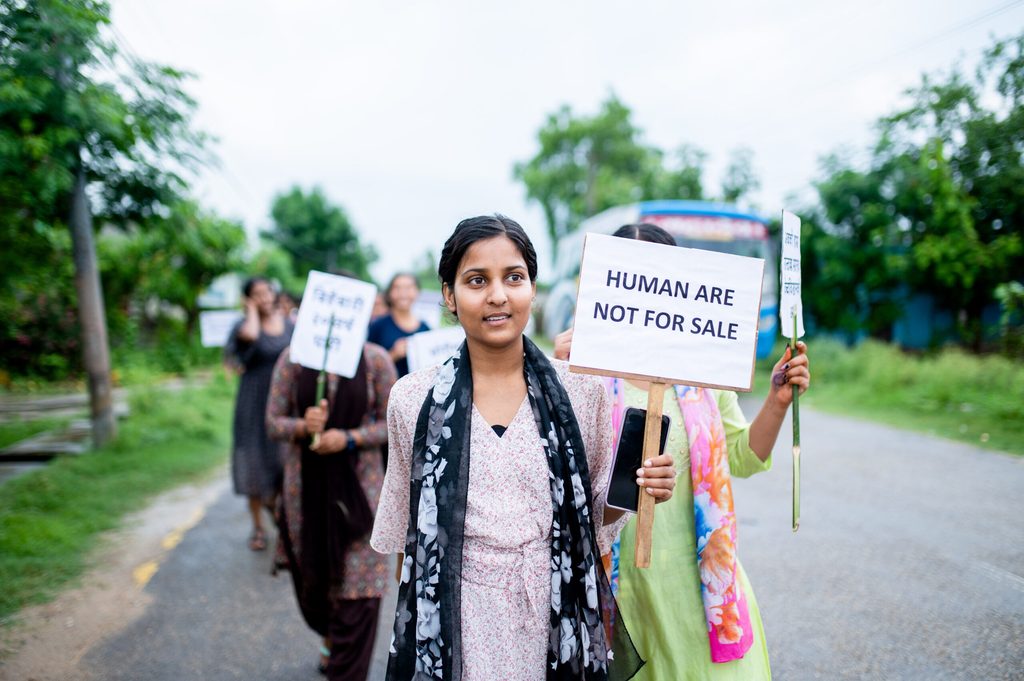The voice of young activists, Turning the World Around report 2023
6 October 2023Launch of the 2023 report, Turning the World Around, spotlights the inspiring impact of girls and young women activists, empowering them to drive change while acknowledging the hurdles they face.

Kathmandu, Nepal – Plan International Nepal proudly unveils a landmark moment with the launch of the report, Turning the World Around: Girl and Young Women Activists Leading the Fight for Equality. Released in alignment with this year’s Girls Get Equal initiative, this report amplifies the voices of girls and young women activists, emphasising the urgent need for heightened activism in safeguarding the rights of girls and women amidst growing challenges.
In a world marked by concerning reversals in the progress of girls’ and women’s rights, the courage and advocacy of girl and young women activists have never been more vital. Turning the World Around not only identifies the barriers these activists confront but also explores the driving forces that propel them forward, strengthening their indispensable role in advocacy.
Spotlight on young female activists
The report focuses on female activists and campaigners aged 15 to 24, sharing their remarkable experiences. The study’s research includes a survey of 840 girls and young women activists, 203 interviews led by the girls themselves, and 7 focus group discussions with 57 female youth activists. With a girl-led approach, the research reflects the voice of the participants, allowing them to bring their lived experiences and expertise forward.
In Nepal, 35 girls and young women activists participated in the survey.

Insights from Nepal factsheet
- Demographics: a significant majority of participants (62%) were aged 15 to 19, highlighting the active engagement of younger girls in activism.
- Top priority issues: in Nepal, the surveyed girls and young women identified gender-based violence (80%) and gender equality (70%) as paramount concerns. And 68% stressed the importance of youth rights and inclusion in political and decision-making processes.
- Less voted issues: while gender-based violence and gender equality claimed top priority, 30% identified conflict and peacebuilding, 35% expressed interest in feminism, and 15% mentioned other issues.
“In the context of Nepal and even to be specific, the girls of the rural and village areas, because of poverty, have not been able to understand the different issues of sexual and reproductive health. They are even in need of training for the very basics of things like how they need to manage menstruation, why it happens, and how many times they must change the pads during menstruation. There is a need to give programmes to the girls who don’t have this knowledge. So, I think this sexual and reproductive health is an important topic,” says 18-year-old Chaarumathi.
“They are even in need of training for the very basics of things like how they need to manage menstruation, why it happens, and how many times they must change the pads during menstruation. There is a need to give programmes to the girls who don’t have this knowledge. So, I think this sexual and reproductive health is an important topic.”
Chaarumathi, 18
The impact of activism
The report reveals the transformative effects of activism on young women:
- 80% experienced a boost in confidence
- 70% developed or acquired new skills
- 68% felt immense pride and satisfaction for contributing to positive change
- Many highlighted the expansion of their social or professional networks
“I have also seen myself change and feel more determined and capable. I used to feel that I was a powerless child before, but now I feel that I am capable,” says 18-year-old Sanjiva.
“I have also seen myself change and feel more determined and capable. I used to feel that I was a powerless child before, but now I feel that I am capable.”
Sanjiva, 18
Sources of funding and barriers
- Funding for campaigns primarily came from government grants (23%).
- Approximately 21% received foreign funding, and 22% benefited from civil society grants, highlighting the diverse financial resources that support their causes.
- Key barriers to activism included a lack of finances or resources and concerns about the views of family and friends.
“I have not really done such activities and campaigns individually. We usually always do it in a team or group. And we feel it is not possible to do it individually because as an individual, we might face so many challenges. The society will say bad things and also criticise the work. We don’t want to get scolded if we initiate some activism alone…so we usually do it always in a team,” says 20-year-old Linishka.
“I have not really done such activities and campaigns individually. We feel it is not possible to do it individually because as an individual, we might face so many challenges. The society will say bad things and also criticise the work. We don’t want to get scolded if we initiate some activism alone…so we usually do it always in a team.”
Linishka, 20
Challenges faced
Activism often came at a cost:
- 48% described financial difficulties.
- 38% felt unheard by adults.
- 35% experienced emotional or psychological distress, including anxiety, due to their activism.
Ram Kishan, Country Director of Plan International Nepal reflects, “The findings of our 2023 flagship report are truly inspiring. Young girl activists are driving positive change, gaining confidence, and acquiring new skills. However, they face real challenges, including financial constraints and societal perceptions. As we celebrate International Day of the Girl, we stand firmly with these activists. Plan International Nepal is committed to supporting their journey toward a more equitable world.”
The power of girls’ activism
The launch of Turning the World Around is central to the Girls Get Equal campaign activities on International Day of the Girl (IDG). Through the Girls Takeover project and IDG events hosted across Plan International, the organisation celebrates the remarkable power of girls’ activism and amplifies the call for support from those in positions of power.
Ahead of International Day of the Girl, Plan International is standing with girls and young women as they call for governments, donors, and civil society to play their part in supporting girl activists to create a better world.
Key recommendations include:

a youth hub member.
- Increased funding for girl and youth-led activist initiatives and groups.
- Governments to support girls and young women to engage meaningfully in all areas of public life. This should include regular access to decision-makers and creating mechanisms for girls to engage in civil society, and formally within institutions.
- Quality education on gender equality, human rights, and democratic governance to build girls’ understanding of activism, and skills training in areas such as organising and public speaking, to build confidence in girls’ ability to campaign and have an influence on the topics they care about.
- All power holders are to play their part in tackling age and gender discrimination, and the threat of violence, and to create safe, open spaces, to remove the barriers to girls speaking out.
Plan International Nepal remains resolute in its commitment to empowering girl and young women activists, ensuring their voices resonate in the global quest for gender equality. With Turning the World Around, the organisation continues to champion girls’ rights and nurture a future where every girl can thrive and lead. Together, we will keep turning the world around for girls and young women, forging a more equitable future for all.


